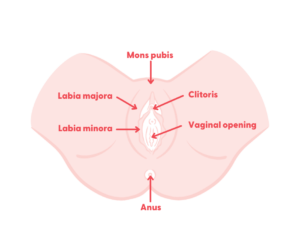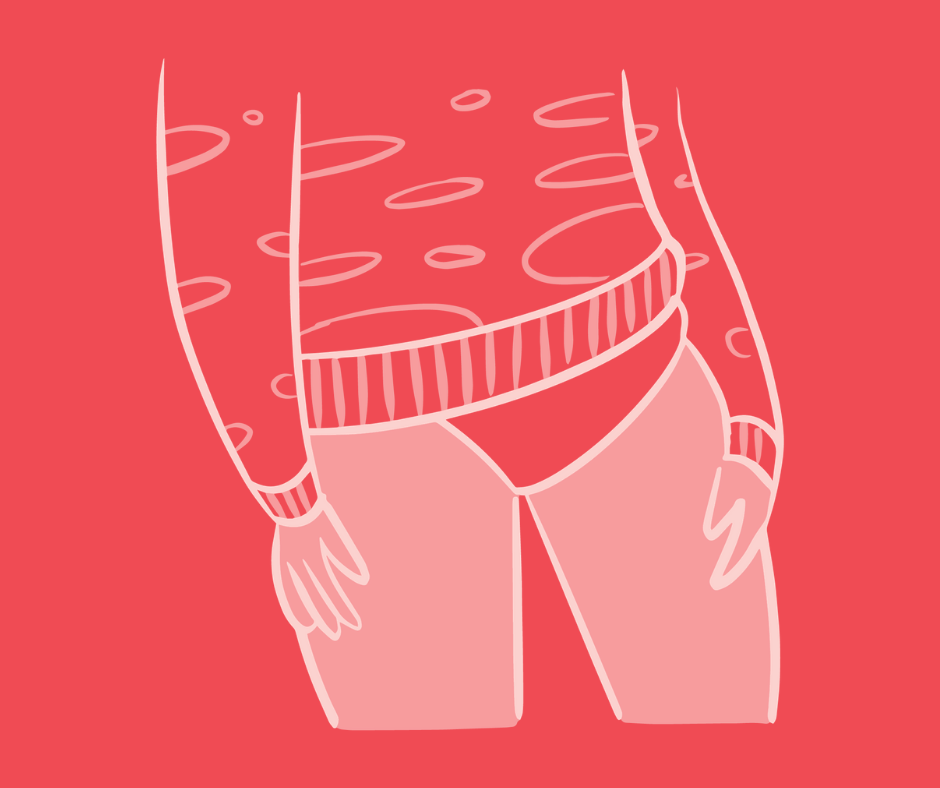11 tips for better vaginal and vulval health
The first thing we need to talk about is that the word ‘vagina’ is often used incorrectly. What you might think of as your vagina, is usually actually your vulva. Before we go any further about keeping these body parts healthy, we should explain…
What is a vagina?
The vagina is the canal inside the opening between a woman’s legs. It connects the cervix (which is the opening to the uterus) to the outside of the body. The vagina has three functions:
- it is where the menstrual blood leaves the body during a period
- it is where the penis or other things like sex toys and fingers are inserted during sex which includes penetration
- it is the birth canal (where a baby comes out of the woman’s body during childbirth)
What is a vulva?
However, the outside part of the female genitals is not the vagina. It is called the vulva, and it includes the mons pubis (the top of the vulva), the labia majora (outer lips) and the labia minora (inner lips). There is also a clitoris which you can find just below the mons pubis, where the labia meet and above the vaginal opening.
Every vulva is unique in terms of shape, size, colourings and differences between the right and left labia. These differences are normal, despite what pornography and the media might have us believe.
It’s a good idea to use a mirror to look at your own vulva. Get to know how your vulva and vagina look, feel and smell. This will help you become more familiar with what is normal for you and notice any changes in things like discharge, smell, colour, bumps, thickening or thinning of the skin or dry skin.
If you do notice anything which seems unusual for you, you should make an appointment to get it checked out.
 To take good care of your vagina and vulva, there are some general tips:
To take good care of your vagina and vulva, there are some general tips:
-
Skip the cleaning
Your vagina is self-cleaning. It has its own unique and well-balanced environment, which has the perfect pH to keep things healthy, and which uses the body’s natural lubrication (vaginal discharge) to keep it clean.
Parts of your vulva are also well-balanced, and very sensitive to change. That’s why you shouldn’t wash any of the areas in and around your vagina which are naturally tucked away and moist.
A general rule is to stick to washing any areas which are easy to reach when you are standing with your legs together, and avoiding any type of soap or body wash in the areas which aren’t accessible when you are standing in this way.
You should never, ever ‘flush out’ (sometimes called douching) your vagina – even with plain water. This can cause irritation and even infection because it disrupts the natural balance. Cleaning your vagina can actually make it smell or produce even more discharge as it tries to fix the changes.
-
Wipe the right way
When going to the toilet, you should always wipe front to back, to avoid moving bacteria from the anus (bottom) to your vulva and vagina.
Try to use soft, unscented toilet paper, and be gentle! A dabbing or patting motion after urinating (doing a wee) is better than a harsh wipe or scrubbing motion.
-
Don’t try to make it smell like roses
You should expect to have a smell around your vulva. It is a natural part of the design of our bodies, which changes throughout our lives and can also be influenced by the time of month. Most of the time the smell shouldn’t be overwhelming or strong, and you should just leave it alone.
You should never use scented products on your vulva or in your vagina, and you should even be careful about bubble baths and other similar products. You should absolutely not ever spray perfume or deodorant on your vulva or vagina!
-
Pee after sex
Sex, even if it is non-penetrative, can disrupt the balance in and around your vagina which can sometimes lead to infections like thrush or urinary tract infections (UTIs). It’s always a good idea to pee after sex, and to gently clean up any excess fluids whether they are your own or your partner’s.
-
Practice safer sex
To take good care of your vagina and vulva you should practice safer sex. Safer sex means that you are taking steps to ensure that you protect yourself and your partner from transmission of sexually transmitted infections (STIs) and blood-borne viruses.
Barrier protection is a great way to protect your vagina and vulva, and includes things like condoms (you can get the traditional male condom, but there is also a female version available) and dental dams (used for oral sex). Make sure that you change condoms in between anal and vaginal sex or you will transfer harmful bacteria into your vagina.
Condoms are good at protecting your vagina, but keep in mind that many STIs are transmitted by skin-to-skin contact, and so your vulva is still at risk. It is a great idea to have regular STI checks regardless of whether you have symptoms, and encourage your sexual partners to do the same.
-
Wear comfy undies
‘Thong’ or g-string underwear can irritate the vulva because it can rub on it, or apply heat and pressure which our bodies then respond to by itching and becoming inflamed. It is best to wear full underwear which is not too tight, and is made from cotton.
Always wash underwear you buy prior to wearing it – this isn’t just to protect you from bacteria if other people have tried it on, but it will wash away the surface chemicals which may be on the underwear from when they were made.
Try to avoid synthetic (human-made) materials for your underwear, and limit the time you spend in things like activewear, swimwear and pantyhose because they trap heat and air flow and this may irritate your vulva or vagina.
If you can, sleep without underwear on.
-
Think about your period products
It is a challenge to find the right period products at the best of times. There are many options out there, each with different benefits. For vaginal and vulval health, though, using a menstrual cup or organic cotton tampon are the best options (as long as you make sure your hands are clean before and after inserting or removing them).
Even though you are putting something into your vagina, tampons and cups are still less harmful options because pads and period underwear restrict the flow of air and hold menstrual blood close to your skin for long periods. Cotton-based products are a better option than those made with synthetic materials.
The most important thing, no matter what product you choose, is great hand hygiene and regular changing of products.
-
Use the right lube
Lubricant can help to protect your vagina and vulva during sexual activity, and it can also increase pleasure. However, it can also irritate the skin. It is important to use the right lube for you and your body, and you might need to try a few to find out what works for you.
It is best to use a water-based lube if you are using it with condoms and/or sex toys, and to have a minimal impact on your vagina and vulva, you should aim for lubes which are labelled paraben, glycerin, alcohol and petrochemical free. Colours, perfumes and flavours are also best avoided.
-
Guard your entry!
It is a great idea to be really mindful of what you put in your vagina. If you or your partner are touching your vulva or vagina it should always be done with clean hands.
Don’t put food in your vagina or on your vulva. It might be fun, but it just isn’t good for you.
-
Make sure your sex toys are safe
Sex toys should be cleaned before and after every use, and should be made from body-safe materials. The sex toy industry isn’t well regulated, and many toys do not have to meet any quality standards.
An Australian site which does have high standards for their products (and also has great options if you are a person living with disability) is www.xesproducts.com.au/.
-
Keep hair down there
Removing hair around your bikini line and above your mons pubis (the mound at the top of your vulva) shouldn’t cause any issues for your vulval or vaginal health – although you may get ingrown hairs or irritation depending on the method of removal.
However unfashionable it may be at the moment (and remember, fashions change), removing pubic hair from your vulva just isn’t good for your vaginal and vulval health. It is there to protect your body, and removing it can leave you vulnerable to infection but it can also cause irritation, discomfort and scarring.
Any questions?
Remember, if you have any questions about what is ‘normal’ or ‘OK’ for you, we invite you to make an appointment with one of our friendly doctors in our clinics around Tasmania.


